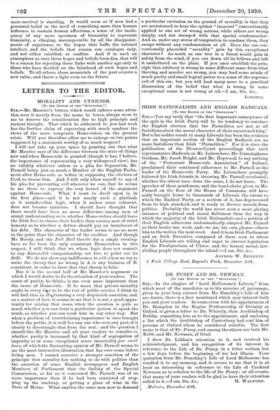LETTERS TO THE EDITOR.
MORALITY AND CYNICISM.
[To THE EDITOR OF THE " SPECTATOR."3
Sin,—Mr. Maurice's letters, which would enforce some atten- tion were it merely from the name he bears, always seem to me to deserve the consideration due to high principle and earnest thought. That which he addressed to you last week has the further claim of expressing with much candour the views of the more temperate Home-rulers on the present crisis. Will you therefore allow me to enlarge on two points suggested by a statement worthy of so much respect P I will not take up your space by pointing out that what Mr. Maurice says of the difference between the state of things now and when Home-rule is granted (though it has, I believe, the importance of representing a very widespread view), has no validity whatever unless as a plea for Separation, Mr. Parnell being just as much a Member of the English Parlia- ment after Home-rule as before it, supposing the electors of Cork to choose him. And I will only allow myself to say of his plea for preventing evil wherever we can, that he seems to me there to express the very kernel of the argument against Home-rule. What I want to dwell upon is, in the first place—and it is not nearly such a platitude as it sounds—that logic, when it makes error coherent, does not become cynicism. I should have thought that there would have been no more difference among men of sound understanding as to whether Home-rulers should leave the Irish free to choose their leader, than among men of strict honesty as to whether a debtor should pay an instalment of his debt. The character of the leader seems to me no more to the point than the character of the creditor. And though Mr. Beesly, and the Pall Mall Gazette for a single evening, have so far been the only consistent Home-rulers in this respect, I still think that we, whom logic does not commit to any distasteful companionship, are free to point out its drift. We do not show any indifference to evil when we try to make the theory that no wrong in A is any business of B, consistent, in order to show that that theory is false.
But it is the second half of Mr. Maurice's argument on which I would desire to fix the attention of your readers. The cause of purity, he thinks, is one even more important than the cause of Home-rule. If he mean that private morality ought in every cbve to be the test of public service, I think he will find that herle-dvancing a very disputable assertion, and, as a matter of fact, it seems to me that it is not a good oppor- tunity for raising that issue, when the question is quite as much whether you can trust a particular person to speak the truth, as whether you can trust him in any other way. But when a problem of overwhelming importance is once brought before the public, it is well for any one who sees any part of it clearly to disentangle that from the rest ; and the question I should like Mr. Maurice and all your readers to consider is, whether purity is increased by that kind of segregation of impurity as in some exceptional sense immorality par excel- lence, of which the fluctuating opinion of Mr. Parnell seems to me the most instructive illustration that has ever come before living men. I cannot conceive a stronger assertion of the principle that morality has nothing to do with politics than the assertion of some English newspapers and English Members of Parliament that the finding of the Special Commission, so far as it concerned Mr. Parnell, was of no more importance than if he had been convicted of stop- ping up the roadway, or getting a glass of wine in the State of Maine. What enables the same men now to demand a particular exclusion on the ground of morality, is that they- are accustomed to hear the epithet " immoral " conventionally applied to one set of wrong actions, while others are wrong simply, and not stamped with that special condemnation.. And so, under any stress of temptation to condone them, they escape without any condemnation at all. Does the one con- ventionally placarded " morality " gain by this exceptional character P As much as one tree in a forest would gain in safety from the wind, if you cut down all its fellows and left it unsheltered on the plain. If you once establish the prin- ciple that adultery is wrong in some different sense from what thieving and murder are wrong, you may lead some minds of much purity and small logical power to a sense of the supreme- evil of this sin; but you will lead many more to a practical illustration of the belief that what is wrong in some- exceptional sense is not wrong at all.—I am, Sir, &c.,
IGNOTITS.










































 Previous page
Previous page